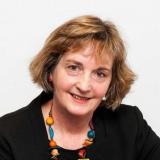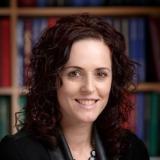Membership

Chair,
Ms
Louise
Johnson
Member with expertise in the regulation of assisted reproductive technology
Ms Louise Johnson spent 16 years as Chief Executive Officer of the Victorian Assisted Reproductive Treatment Authority (VARTA), stepping down in February 2021. VARTA regulated the provision of fertility treatments in Victoria and played an educative and support role for people seeking to have a baby using IVF and managed the state’s donor conception registers.
A graduate of the Australian Institute of Company Directors, with postgraduate qualifications in regulatory studies, management and education, Ms Johnson previously worked as a hospital microbiologist and a science teacher. She also held roles in the NGO sector prior to joining VARTA, including with the Cancer Council of Victoria and Occupational Therapy Australia.
Ms Johnson has been a member of ERLC since 2018 and also served as a Member of the Mitochondrial Donation Implementation Working Committee (2021). She is on the Board of Directors for Central Highlands Rural Health, Chairs its Consumer Advisory Committee and is a member of the Clinical Governance and Project Control Committees. Ms Johnson is a Community Representative on the Australian College for Emergency Medicine’s, Council of Advocacy, Practice and Partnerships. She also served as a community member on the Victorian Board of the Medical Board of Australia and previously as a panel member for the Patient Review Panel, a Victorian Government Panel that considers applications for surrogacy and other types of assisted reproductive treatment. Her extensive work to advance women’s health was recognised in 2019 as a Women’s Health Victoria ‘Champion for Women’ in recognition of her board and executive work.
Declaration
- Director of Langston Environment Pty Ltd
- Professional affiliations as noted in profile

Professor
Jackie
Leach Scully
Member of the Australian Health Ethics Committee
Professor Jackie Leach Scully is Professor of Bioethics and Director of the Disability Innovation Institute at the University of New South Wales.
With a background in molecular biology and further training in neurobiology, Professor Scully is a bioethicist specialising in disability and feminist bioethics. Her overarching research interest follows the socio-ethical response of various cohorts to technological innovation, with a particular focus on people with disability and other marginalised communities. Professor Scully has specialised bioethics expertise in new reproductive technologies, prenatal selection and screening, genomic medicine including personalised medicine and genome editing, transplantation and artificial intelligence.
She serves on a range of Clinical Ethics Committees across Sydney and chairs NSW Health's Ethics Advisory Panel. She has served in a number of bioethics advisory capacities and is former Executive Director of the Policy Ethics and Life Sciences Research Centre at Newcastle University, United Kingdom.
Professor Scully has been a member of the Australian Health Ethics Committee (AHEC) since 2021. In 2023, Professor Scully was appointed to the ART Guidelines (Mito) Working Committee, which was established to update the Ethical guidelines on the use of assisted reproductive technology in clinical practice and research (2017) to enable the ethical introduction of mitochondrial donation in Australia.
Declaration
- Member, International Association of Feminist Approaches to Bioethics Advisory Board (ex officio)
- Potential provision of fee for service and pro bono consultancies on behalf of institutional affiliations and self
- Likely future applicant to NHMRC for research funding
- Institutional employment and professional affiliations as noted in profile

Professor
Lynn
Gillam
AM
Member with expertise in research ethics
Professor Lynn Gillam AM is a Professor in Health Ethics at the University of Melbourne and the Academic Director for the Children’s Bioethics Centre, Royal Children’s Hospital.
A clinical ethicist trained in philosophy and bioethics, Professor Gillam’s research is focused on human research ethics and paediatric clinical ethics. She has previously Chaired the University of Melbourne’s Central Human Research Ethics Committee and was a member of the Research Ethics and Integrity Standing Committee. She provides policy advice and leads research into a range of issues in paediatric clinical ethics, including end of life decision-making, management of differences of sex development, information-giving to children, fertility preservation for prepubertal children undergoing gonadotoxic treatment, use of high-cost investigational drugs and parental refusal of treatment.
Professor Gillam first served on ERLC from 2009 to 2015 and again for the 2021–2024 triennium. She was also a member of NHMRC Clinical Ethics Capacity Building Working Committee (2013–2015). She is currently a member of the WHO Advisory Committee on Clinical Ethics, the Victorian Newborn Bloodspot Screening Committee and is an Ethics Consultant for the Australian Health Practitioner Registration Agency.
Professor Gillam was awarded the Royal Children’s Hospital Chairman’s Medal (2018), in recognition of her work and was made a Member of the Order of Australia in 2019 for service to medical education in the field of bioethics.
Declaration
- Provision of fee for service and pro bono consultancies on behalf of institutional affiliations and self
- Recipient of, and likely future applicant to, NHMRC for research funding, including salary support for self and/or team
- Institutional employment and professional affiliations as noted in profile.

Professor
Josephine
Bowles
Member with expertise in a relevant area of research (appointed 29 July 2025)
Professor Josephine Bowles is an academic at the University of Queensland School of Biomedical Sciences and a Fellow of the Society for Reproductive Biology.
Professor Bowles has extensive experience in the fields of developmental and stem cell biology, embryology, reproductive biology and also lectures in biomedical ethics. She leads research in the area of mammalian developmental reproductive biology and embryology and has extensive expertise in the associated technologies. Her work has been published in high-impact journals and her research has been cited widely, reflecting its influence in the field of reproductive biology.
Professor Bowles also contributes to the scientific community through her mentorship of early-career researchers and her involvement in collaborative projects that explore the effects of environmental factors on reproductive development. Her research has implications for understanding fertility, developmental disorders, and the impact of endocrine-disrupting chemicals on human health.
Declaration
- Institution employment and professional affiliations as noted in profile

Professor
Roger
Hart
Member with expertise in assisted reproductive technology
Professor Roger Hart is an internationally recognised leader in the field of reproductive medicine with expertise in the fields of infertility and polycystic ovary syndrome. He is a Professor of Reproductive Medicine at University of Western Australia and the National Medical Director of City Fertility.
Professor Hart has published over 200 papers in the fields of infertility, IVF, polycystic ovary syndrome, in vitro maturation and endometriosis. He has a particular interest in the longer-term outcome of IVF on the woman and the child, and the early life origins of male and female reproductive disorders. He is also a lead researcher for the Western Australian Pregnancy Cohort (Raine) Study, the largest and longest cohort study of children born from IVF.
In addition to his strong research contributions, Professor Hart’s leadership was instrumental in establishing an IVF unit as the Medical Director of Fertility Specialists of Western Australia, now part of City Fertility, from its inception. In 2022, Professor Hart Chaired the Ministerial Expert Panel (MEP) on Assisted Reproductive Technology and Surrogacy Legislation for the Government of Western Australia. The MEP was convened to advise the WA Government on the development and implementation of proposed State legislation for ART and surrogacy. He also continues to contribute as a member on a number of boards within the industry including the RANZCOG reproductive endocrinology and infertility committee, Clinical Advisory Committee of Endometriosis Australia the Healthy Male Society and Director of the Menopause Alliance Australia and as Chair of the Scientific Committee of Merck Symposium on infertility.
Declaration
- Director of Menopause Alliance Australia
- Director of own private medical practice
- Institutional employment and professional affiliations as noted in profile.

Professor
Jane
Nielsen
Member with expertise in a relevant area of law
Professor Jane Nielsen is a Professor in Law at the University of Tasmania with extensive research experience on legal and ethical issues pertaining to the development of innovative health technologies and genomic data sharing.
Professor Nielsen was a Chief Investigator on three Australian Research Council Discovery grants, two Medical Research Future Fund grants and a consultant in two consultancy projects for federal agencies. Her research has focused on the ethical and legal issues surrounding the creation and use of genomics data, the intersection between intellectual property law and competition law in relation to patenting biotechnology innovation and the regulation of innovative health technologies.
In addition to her research, Professor Nielsen has practised as a solicitor, and has contributed to the legal education field as Chair of the Board of the Tasmanian Centre for Legal Studies and current Associate Head of Learning and Teaching for the Faculty of Law at the University of Tasmania. She also brings experience in the ethical governance of research through her past Memberships and Chairing of university committees, including the University of Tasmania’s Academic Misconduct Committee and Tasmania Social Sciences Human Research Ethics Committee.
Declaration
- Institutional employment and professional affiliations as noted in profile
- Recipient of, and likely future applicant to, NHMRC for research funding, including salary support for self and/or team.

Ms
Emma
Turner
Member with expertise in consumer health issues relating to disability and disease
Ms Emma Turner is a lawyer with 20 years of experience across the government, health and disability sectors. She is currently General Counsel for Austin Health and previously held the General Counsel and Company Secretary role for CareChoice, an organisation delivering disability services, out of home care, developing and leasing specialist disability accommodation.
Early in her career, Ms Turner was involved with multiple law and policy reforms in Victoria including as principal advisor on significant legal reforms to the Equal Opportunity Act 1995 (Vic) for the Victorian Equal Opportunity and Human Rights Commission; Legal Policy Officer for the Department of Justice Victoria, reviewing civil law reform priorities including reform of guardianship and administration law and powers of attorney; and as an Associate to the Patient Review Panel for the Victorian Department of Health taking responsibility for the carriage of legislative amendments on ART policy related to donor-conceived individuals’ access to information about their donors.
Ms Turner has also held senior roles in a commercial law firm, which included providing advice on the regulation of emerging biotechnologies.
Declaration
- Director of ELT ILP Pty Ltd
- Professional affiliations as noted in profile.
Vacant
Member with expertise in consumer issues relating to assisted reproductive technology (from 28 January 2026)

Professor
Patrick
Tam
Member with expertise in embryology
Professor Patrick Tam is Deputy Director and Head of Embryology Research Unit at the Children’s Medical Research Institute, and Professor in the School of Medical Sciences, Faculty of Medicine and Health at the University of Sydney. Professor Tam is currently the Lead Investigator of Enabling Platform in Functional Genomics of the Luminesce Alliance Paediatric Precision Medicine Program.
Professor Tam’s research focuses on the functional attributes of the gene regulatory network in embryonic patterning, lineage development, embryogenesis and stem cell differentiation. The research work has revealed the cellular and molecular mechanisms that underpin the organisation of the early embryo’s basic body plan and guides the development of protocols to facilitate stem cell differentiation into clinically useful cell types for cellular therapy.
Professor Tam has been a member of ERLC since 2015 and served on NHMRC’s Mitochondrial Donation Expert Working Committee (2019–20) and Mitochondrial Donation Implementation Working Committee (2021). He is a member of the Steering Committee of Australian Functional Genomics Network, and Chair of its Scientific Review Panel, and serves on scientific advisory committee of research consortium in precision medicine and stem cell medicine internationally. Professor Tam is a member of a number of international learned societies in Developmental Biology and Stem Cell Biology, and serves on the editorial board of scientific journals: Developmental Cell, Developmental Biology, Differentiation, Genesis, and the International Journal of Biological Sciences.
Professor Tam was awarded the President’s Medal of the Australia and New Zealand Society of Cell and Developmental Biology in 2007 and the Julian Wells Medal in 2019. He is a Fellow of the Australian Academy of Science, the Royal Society of London, Royal Society of Biology and the Australian Academy of Health and Medical Science.
Declaration
- Member of Australian Research Council Medical Research Advisory Group
- Provision of fee for service and pro bono consultancies on behalf of institutional affiliations and self
- Recipient of, and likely future applicant to, NHMRC for research funding, including salary support for self and/or team
- Institutional employment and professional affiliations as noted in profile.
Past members
Professor
Sarah
Robertson
Member with expertise in a relevant area of research (to 1 June 2025)
Professor Sarah Robertson is a world-renowned reproductive biologist whose innovative research in reproductive immunology has formed the basis for a new understanding of the origins of health at conception. She has identified specific cytokines and immune cells that regulate embryo implantation and fetal development, and has demonstrated that male seminal fluid acts to induce adaptations in the female immune response that promote receptivity to pregnancy. Her work shows that the immune system channels environmental signals from both female and male parents to contribute to reproductive success and shape offspring phenotype through non-genomic pathways. These discoveries are improving practise in reproductive medicine and providing insight into early life origins of child health.
Dr
Cal
Volks
Member with expertise in consumer issues relating to assisted reproductive technology (to 27 January 2026)
Dr Cal Volks’ research uncovers how digital platforms shape donor reproductive practices, kinship and identity formation in donor assisted reproduction. A social science researcher and counsellor, she has worked with the Victorian Assisted Reproductive Treatment Authority as a donor linking counsellor and later providing supervision to the donor-linking counsellors and has been a Senior Infertility Counsellor in private practice. She has worked extensively in the field of reproductive and sexual health, particularly around assisted reproduction and HIV/AIDS for as a researcher, public educator, manager and counsellor.